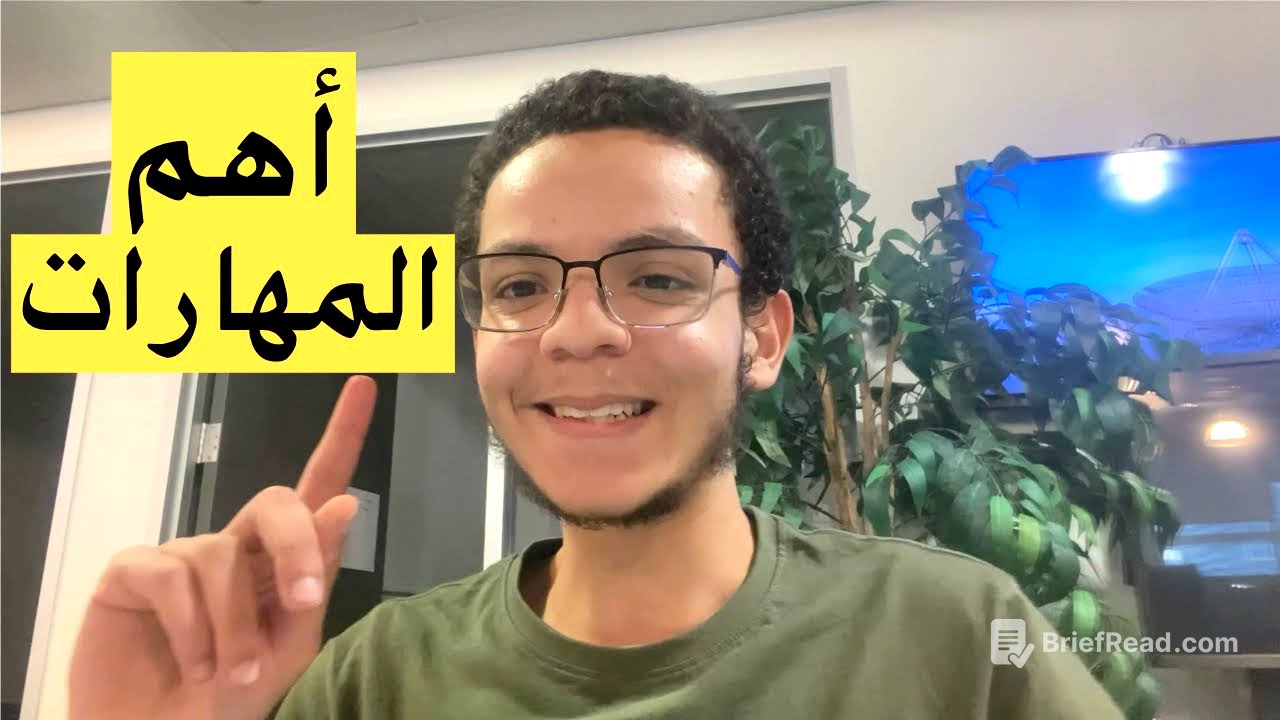TLDR;
This video provides essential advice and skills to focus on before the age of 18, emphasizing that it's never too late to start. It highlights the importance of continuous self-improvement, balancing religious, academic, and personal development. Key skills include mastering the English language, memorizing the Quran, learning programming, seeking to earn a living, and cultivating good habits and morals. The video also stresses the significance of courage, self-reliance, and resilience in overcoming failures.
- English language proficiency is crucial for self-investment.
- Memorizing the Quran guides to righteousness and success in both religion and life.
- Programming skills enhance logical thinking and problem-solving abilities.
- Earning a living early builds valuable life skills and financial independence.
- Good habits (sleep, exercise, eating) are fundamental for concentration and energy.
- Courage and generosity are essential moral skills.
- Self-reliance and resilience are key to continuous improvement and overcoming failures.
Introduction: Important Skills to Learn Before 18 [0:00]
The video addresses the question of what skills and tips are most important to learn before the age of 18, clarifying that this age is not a strict limit but rather a suggestion for building oneself early. The speaker emphasizes that while starting young is advantageous due to more time, fewer responsibilities, and stronger memory, it is never too late to acquire these skills. The advice is applicable to individuals of all ages who seek self-improvement.
The Importance of English and Quran [0:19]
The speaker highlights the importance of learning English as a valuable investment in oneself. Additionally, the speaker emphasizes the significance of memorizing the Quran, describing it as the most important skill. Memorizing the Quran helps individuals recognize mistakes in morals, worship, and dealings, guiding them towards righteousness and the best version of themselves. The Quran provides guidance and pushes individuals to be their best selves, leading to success in both religious and worldly aspects.
Programming Skills and Early Work Experience [2:28]
The speaker underscores the value of programming skills, regardless of one's specialization. Basic programming knowledge, such as creating websites or simple applications, is beneficial in any field. Combining field-specific experience with programming skills can lead to innovative solutions and financial opportunities. The speaker also advocates for entering the job market early, especially for men, to gain practical experience and financial independence. Even if the work is a combination of learning and earning, it is important to think about how to generate financial income from learned skills.
Building Personality: Habits and Gaza Remembrance [6:16]
The speaker emphasizes the importance of basic habits such as sleep, exercise, and eating for building a strong personality. Good sleep, regular exercise, and proper nutrition are fundamental for concentration, discipline, and energy. The speaker also highlights the importance of remembering and praying for those in need, using an alarm as a reminder to support the cause of Gaza.
Building Habits with Alarms [7:38]
The speaker shares a method for building habits using alarms. By setting alarms with specific messages, individuals can prompt themselves to perform tasks or remember important issues. This technique is particularly useful in environments where reminders like the call to prayer are absent. Alarms can be set for various activities, including prayer, reading, exercise, and sleep, to reinforce desired behaviors.
Sports, Martial Arts, and Generosity [8:56]
The speaker shares a personal experience with judo, highlighting the benefits of sports and martial arts for discipline and self-defense. The speaker transitions to the importance of generosity as an acquired skill. Generosity extends beyond money to include sharing knowledge and helping others succeed. Being generous with knowledge and resources contributes to the success of the community.
Courage and Saying the Truth [11:18]
The speaker emphasizes the importance of courage, particularly in speaking the truth. Balancing strong principles with a gentle approach is crucial. The speaker shares a personal anecdote about correcting an imam's mistake during prayer, illustrating the need to overcome fear and uphold what is right. Speaking the truth politely and standing up for one's rights are essential skills to develop.
Self-Reliance and Taking Initiative [14:50]
The speaker stresses the importance of self-reliance and taking initiative rather than solely relying on advice. Individuals should assess their needs and circumstances to tailor advice to their specific situations. Setting priorities and committing to small, consistent actions are key to achieving long-term goals. The speaker advises against idealism and encourages starting with manageable steps.
Practical Steps for Quran Memorization and English Learning [17:37]
The speaker provides practical steps for Quran memorization and English learning. For Quran memorization, committing to a weekly session with a teacher or family member is recommended. For English learning, watching a video daily or every other day and setting alarms as reminders can help maintain consistency. The speaker advises focusing on the starting point rather than being overwhelmed by the end goal.
Resilience and Continuous Improvement [20:11]
The speaker emphasizes the importance of resilience and continuous improvement. Despite failures or setbacks, individuals should persist and get back up. Despair should not take over, and every new day is an opportunity to repent and start anew. The speaker encourages individuals to correct mistakes and continue learning, emphasizing that it is never too late to improve.
The Real Loss and Encouragement for the Youth [23:19]
The speaker defines the real loss as facing judgment with a negative outcome, urging listeners to seize every opportunity to learn and correct mistakes in this world. The speaker shares an anecdote about advising a young boy to focus on self-improvement from a young age, emphasizing that starting early can lead to surpassing even those who started later. The speaker encourages the youth to work on themselves and stay away from negative influences.









